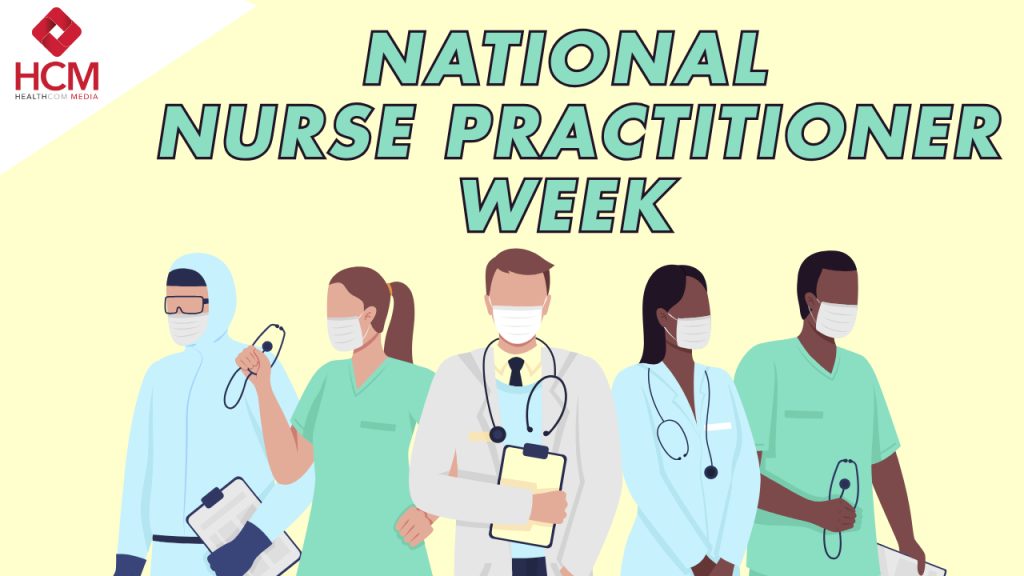Nurse Practitioner Week is celebrated annually in the second week of November. This is the perfect time to recognize the role of the nurse practitioner (NP) in shaping healthcare in the United States. NPs provide holistic and compassionate care while advancing the nursing profession. Utilizing an evidence-based approach while providing clinical expertise, NPs serve as advocates and leaders in the healthcare industry, demonstrating that they’re the “Heart of Healthcare.”
History of the NP role
The profession has expanded significantly since the inception of the NP role in the 1960s by Dr. Loretta Ford and Dr. Henry Silver due to nationwide healthcare provider shortages. In 1965, the University of Colorado offered the first program. NPs benefit the healthcare system by increasing the number of primary care providers currently available in sparse numbers throughout the United States. Rural areas are especially underserved and desperately need providers willing to extend services. As described by Berg, by providing diagnoses, prescriptions, and the autonomous provision of care, NPs answer the call for healthcare providers.
In 2023, the U.S. News & World Report declared NP the #1 healthcare job in the United States. This recognition highlights not only the high level of job satisfaction among NPs but also the growing ability of these professionals to meet the increasing need for healthcare providers.
The past: Advocating for the profession
NPs have advocated for many years for issues such as access to care, independent practice, and autonomy over their practice. In 1971, Idaho was the first state to recognize the NP role and title. Nearly two decades later, in 1994, states (including Alaska, Iowa, Montana, New Mexico, and Oregon) began granting NPs full practice authority. Finally, in 1997, NPs were allowed Medicare reimbursement for services provided. Currently, 27 states recognize full practice authority, with Utah joining their ranks in March 2023.
The future: DNP as entry to practice and full practice authority nationwide
One of the most challenging battles for the NP profession remains the achievement of full practice authority in all states. Some states, such as Georgia, have oversight for licensure by the Georgia Medical Board (GMB). To practice in Georgia, NPs must have an APRN Protocol Agreement approved by the GMB. This lengthy process can delay entry to practice.
In areas such as Georgia, the full practice authority movement is particularly significant due to the vast number of rural areas that need direct access to healthcare. NPs are ready to fill this gap, but they continue to encounter multiple obstacles. According to the American Association of Nurse Practitioners (AANP), studies have consistently shown that NPs deliver comparable care to physicians, with positive outcomes such as lower hospitalization rates and higher patient satisfaction.
Gaining credibility as a primary care provider has been daunting for NPs. Key organizations, such as the American Association of Colleges of Nursing and the AANP, support the doctor of nursing practice (DNP) as a terminal degree for entry to NP practice. The advanced training and expertise of the DNP provide the role with recognition and respect to move forward with efforts for full practice authority nationwide to meet the critical need for primary care services.
NPs as policy advocates and pivotal players
NPs play a pivotal role in health policy revisions, implementation of safe practices, and advocacy to improve the population’s health. Being involved in creating and revising health policy demonstrates the reachable depth of the NP role in addressing the various elements of social determinants of health and the objectives set in Healthy People 2030. Several nursing organizations, including the American Nurses Association and AANP, have political action committees that support NPs in their efforts for recognized as autonomous providers nationwide.
NPs remain committed to advancing the profession through innovative research, continuing education, and policy advocacy. The professionalism and dedication to public health demonstrate the leadership of NPs and their ability to pave the future of tomorrow’s healthcare.
The heart of healthcare
The progress and perseverance of NPs over almost 60 years demonstrate the resiliency of the role. NPs are uniquely positioned to address some of the most pressing challenges in healthcare today, and their full potential will only be realized when full practice authority is granted nationwide.
As we celebrate NP Week 2025, let’s honor the legacy of the NP profession, which demonstrates the “Heart of Healthcare.” This legacy allows NPs to look forward to a future of empowerment to ensure that all patients receive the care they need and deserve.
Janice Dykstra Dunlap, DNP, ARNP, AGPCNP-BC, ACNS-BC, is DNP Curriculum Coordinator at the University of St. Augustine for Health Sciences in St. Augustine, Fla.
References
American Association of Colleges of Nursing. Fact sheet: The doctor of nursing practice (DNP). June 2024. aacnnursing.org/Portals/0/PDFs/Fact-Sheets/DNP-Fact-Sheet.pdf
American Association of Nurse Practitioners. AANP advocacy: Championing the NP role and amplifying the NP voice. aanp.org/advocacy
American Association of Nurse Practitioners. Discussion paper: Doctor or nursing practice. 2013. aanp.org/advocacy/advocacy-resource/position-statements/discussion-paper-doctor-of-nursing-practice
American Association of Nurse Practitioners. Founders: Dr. Loretta Ford. aanp.org/about/founders#:~:text=At%20the%20University%20of%20Colorado,the%20nation’s%20first%20NP%20program
American Association of Nurse Practitioners. Quality of nurse practitioner practice. 2023. aanp.org/advocacy/advocacy-resource/position-statements/quality-of-nurse-practitioner-practice
American Association of Nurse Practitioners. State practice environment. October 2024. aanp.org/advocacy/state/state-practice-environment
American Association of Nurse Practitioners. Utah’s new law will improve patients’ healthcare access. March 16, 2023. aanp.org/news-feed/utahs-new-law-will-improve-patients-health-care-access
American Nurses Association. Political action committee. https://ana.aristotle.com/SitePages/pac.aspx
Berg JB. The perils of not knowing the history of the nurse practitioner role. J Am Assoc Nurse Pract.2020;32(9):602-9. doi:10.1097/JXX.0000000000000441
Brom HM, Salsberry PJ, Graham MC. Leveraging health care reform to accelerate nurse practitioner full practice authority. J Am Assoc Nurse Pract. 2018;30(3):120-30. doi:10.1097/JXX.0000000000000023
Georgia Composite Medical Board. Nurse protocol agreements reviewed by the board. medicalboard.georgia.gov/professional-resources/nurse-protocol-agreements-reviewed-board
Office of Disease Prevention and Health Promotion. Social determinants of health. Healthy People 2030. U.S. Department of Health and Human Services. odphp.health.gov/healthypeople/priority-areas/social-determinants-health
U.S. News & World Report. Best health care jobs. money.usnews.com/careers/best-jobs/rankings/best-healthcare-jobs

